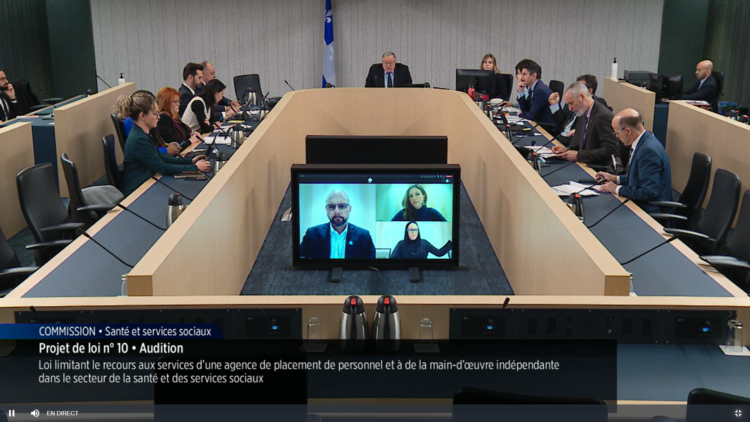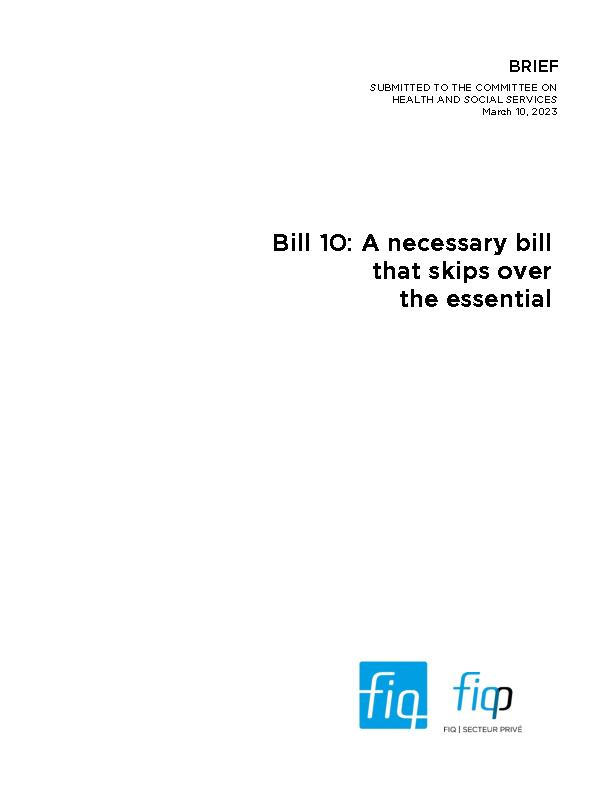
Bill 10 : The FIQ is demanding that unequal working conditions cease and requiring the gradual elimination of private healthcare employment agencies
Today the Fédération interprofessionnelle en soins du Québec – FIQ spoke at the parliamentary committee on Bill 10: An Act limiting the use of personnel placement agencies’ services and independent labour (IL) in the health and social services sector. “The Federation has been demanding legislation, but this is not what it has been waiting for. It is crucial that further work be done to modify Bill 10 so that it is truly restrictive and provides the groundwork to tackle what should have been at its very essence, i.e., the elimination of the use of IL in the public health network,” said Julie Bouchard, FIQ President.

Bill 10: A necessary bill that skips over the essential
Before the committee members, the Federation reiterated that if the government’s true goal is to cut the public network off from IL, then the bill’s intention must not stop at limiting it but work to eliminate it completely. “Otherwise, as soon as the public network is weakened, it will be child’s play for the agencies to rewrite the rules to their advantage with no legislative restrictions. Moreover, as long as there are private agencies, they will contest restrictions. And if the past is any indicator of the future, we cannot count on government directives or regulations to achieve this. We saw time and time again that neither employers nor agencies respected them. The only way to ensure this objective is reached is with a law that has teeth and in which all of the rules are stipulated,” explained the president.
A demand to end the iniquities
In the brief it submitted to the committee, there are several recommendations for the government, including one saying that Bill 10 should include measures that the government will implement to put an end to the inequality between the working conditions of public network professionals and agency personnel. “The measures that the Federation is demanding are aimed at prioritizing the healthcare network employees over IL and that the use of IL be a last-resort solution. It is not only important to put limits on the use of agency staff, it is even more important to improve the working conditions in the network,” said Ms. Bouchard.
It is also imperative that we stop agencies from recruiting healthcare professionals in the network to stop the exodus that has been happening for several years, well before the pandemic. “It is unthinkable to let private agencies freely recruit their workforce from the public network. We recommend that the bill prohibit employment agencies from assigning a healthcare professional who is already employed, or who left this employment within less than a year, by a public institution in the same or an adjacent administrative region,” concluded the president.
Among the examples of what should happen during the transition period leading up to the elimination of IL, the Federation recommends:
- That the rates charged by the agencies be reduced as much as possible and that agencies not be able to charge overtime at time and a half for overtime done by the employees it assigns;
- That the IL be subject to the same inconveniences as the network healthcare professionals as regards the obligatory granting or not of overtime shifts;
- When there are desirable and undesirable shifts to fill, that institutions be obliged to prioritize their staff for the desirable shifts;
- That the Committee on Health and Social Services be given a temporary mandate to evaluate the impacts of independent labour on the remuneration of government employees and on patients and the quality of care with the elimination of IL as the main objective. Furthermore, that this mandate end with a policy proposal to develop a process for determining a maximum rate that employment agencies can charge healthcare institutions in order to create balance in permanent staffing within healthcare institutions.
The FIQ hopes that these recommendations fuel the committee members’ reflections so that the future detailed study can lead to significant improvements in Bill 10 for the well-being of healthcare professionals, of course, but also for the well-being of patients and the survival of our public healthcare network.